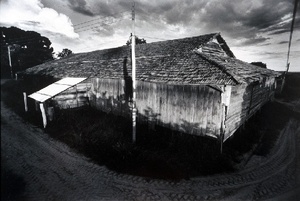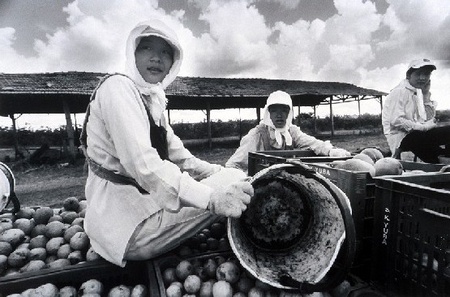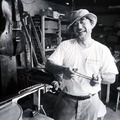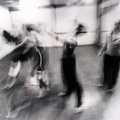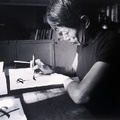Read the introduction to the Yama Project >
YAMA: Embrace the ordinary and nurture a spirit of gratitude
誰の墓と 聞いて子供等 手を合わす
whose grave is it?
ask the children
palm to palm in prayer
—Katsue Yuba (b. 1947)
With a copy of Rousseau’s Emile and the collected works of Tolstoy packed among newly purchased farming tools, metal pots, and Japanese quilts and bedding, Isamu Yuba in 1926 left Kobe, Japan in search of adventure. Later he would reminisce on that fateful day when he came face to face with a placard in front of a train station with the words “Onward to South America, Land of the Free.” The words seemed to beckon him. They answered his restless questioning and reflected the belligerence of the times. There were few others who enjoyed stirring up trouble more than Isamu Yuba.
Most Japanese emigrants in the early part of the twentieth century left with dreams of making their fortunes abroad all the while envisioning a triumphant return to their home village. Yuba, who was never one for such serious plans, left Japan with a head full of ideas. Although he would have denied being called an intellectual, Yuba, nonetheless, credited Rousseau and Tolstoy with the germination of his ideals. Obviously, Isamu Yuba was not your typical émigré. Making a fortune certainly appealed to him, but he would gather round him a group of loyal followers who would be challenged by his radical beliefs and shaken by his explosive and unpredictable nature. People would say that he demanded an unquestioning loyalty evocative of feudal age samurai retainers and modern-day Japanese yakuza gangsters.
Yuba’s dynamism was already evident in his youth. Even at age nineteen he commanded the family as eldest son. Persuading not only his parents, but also his aging grandmother to accompany him, Yuba boarded the ship, Hawaii Maru, and headed blindly off into the unknown frontier of Brazil. The irony of the ship’s name was certainly not lost on its passengers. The United States in 1924 had closed its door and no longer welcomed emigrants from Asia. Japanese emigration to the U.S., which had begun in 1868, the first year of the Meiji Emperor’s reign, was abruptly halted and attention turned southward to the Latin American nations. With his seven siblings in tow, the youngest still an infant of only one, Isamu Yuba headed a party of eleven and prepared for resettlement. Leaving not one member of the family behind in Japan, it is unlikely that Yuba ever planned on returning to his homeland. The Yuba family had long served as village headmen in the small town of Najio, located outside the bustling town of Kobe. They left no great fortune. The modest prestige of a past leadership role in a small Japanese village should no longer have been part of his birthright in a new land. Yet, Yuba was born to lead. Knowing next to nothing of being a farmer did not stop him from making the Yuba Farm one of the largest poultry farms in all of Brazil in the years preceding World War II.
The story of Yuba fascinates and frustrates for it is not a newcomer’s story of stoicism and perseverance. Rather, it is an outrageous tale of blatant foolhardiness and impractical adventurism. In the early days when food was scarce, Yuba bought baseball uniforms and a piano. For miles around Yuba owned the sole camera—a fine German one that he used to document farm life. With a film projector and a simple screen made from chicken feed bags, he brought the best of Japanese cinema to this remote part of Brazil. He encouraged dance, song and painting. While others grew crops to make a living, Yuba seemed just as intent on raising people to live off the land. As agricultural pioneer and adventurer, Yuba was a cultivator of the human spirit. Others labeled him crazy and impractical. Yuba, on the other hand, was determined to show his fellow immigrants that a sole preoccupation with accumulating wealth in this foreign land lacked vision. Without respect for the land and without a spiritual and artistic focus, the immigrants would leave nothing of cultural value to their children. In the words of Yuba, “their labor would be meaningless unless they could rewrite the history of South America.”
In a rural part of Sao Paulo state six hundred kilometers to the northwest of the capital city, the legacy of Isamu Yuba lives on today in a unique arts community known in Brazil as Comunidade Yuba. Only a simple wooden sign with the name “Yuba” marks the turnoff from the asphalt highway onto the red dirt of a country lane. The lane winds past guava fields, a packing shed, battered farm tractors, tennis court and swimming pool. Passing in front of the simple amphitheater known as Teatro Yuba, one ends up at the heart of life at Yuba—the cozinha or communal outdoor mess hall. Isamu Yuba’s guiding philosophy for the community tenaciously endures: to work the land, to embrace the ordinary, and live daily with the arts.
During the early pioneering days, the people drawn together by Yuba’s ideals began to refer to their home as “Yama.” Today those born in the community use this word to define an extraordinarily ordinary way of life. The word yama in Japanese means “mountains.” But, as one drives endlessly across flat plains broken only by an occasionally hilly mound with a herd of grazing cattle, there are few mountain peaks in this part of Brazil. The community’s name originates from an idiomatic use of the word. To farmers in mountainous Japan, “going to the mountains,” meant setting off for work. As immigrants cleared the virgin Brazilian forest they found themselves echoing these same words. Since farming sustains the Yuba community, those born there have come to use this word to define their existence.
© 2004 Janet Ikeda


